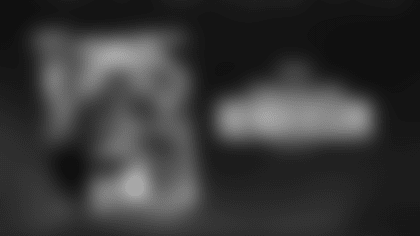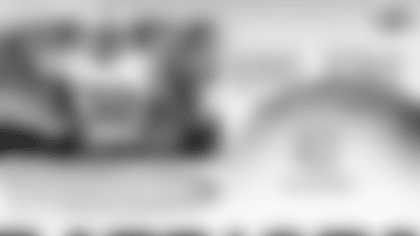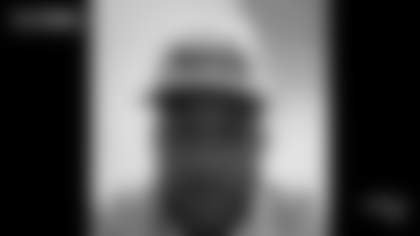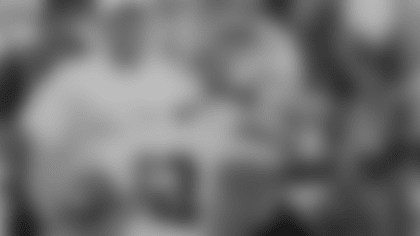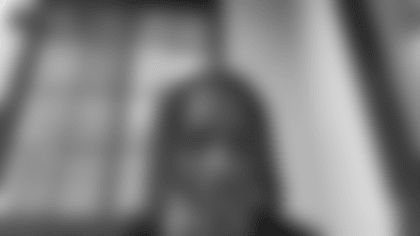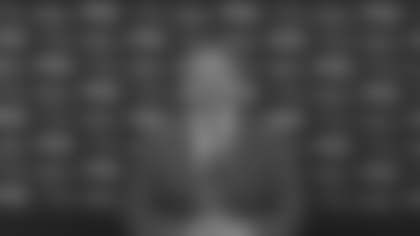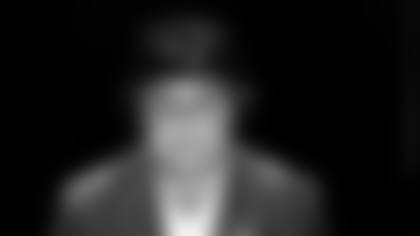ROBERT KRAFT AND JEROD MAYO
PRESS CONFERENCE
January 17, 2024
RKK: I didn't know Foxboro had that kind of draw, beautiful downtown Foxboro. Well, welcome, and good afternoon, everyone. It's been nearly a quarter of a century since we announced a new head coach. Today I'm happy to welcome you all here as we introduce the 15th head coach of the New England Patriots, Jerod Mayo. It's an honor to share this announcement with Jerod's family, Chantel, and their beautiful children, Chya, Jerod, Jr., Chyanne, and Chylo, Jerod's wonderful mom, Denise and stepfather Wilson, his brothers Deron, Derek, and Shermont (phonetic), and his highly respected grandparents, Walter and Rosa, who I've heard great things about. I've been running businesses for more than 50 years, and in my experience, the most successful leadership transitions happen when we're privileged to develop talent from within. That allows us to create a succession plan that allows the candidate to better prepare for the opportunity when he arrives. I first met Jerod in 2008 after we drafted him 10th overall out of the University of Tennessee. On that day, we introduced him to the media, and I remember him immediately coming up to me and saying, Kraft and Mayo, they go together pretty well. 16 years later, here we are. As a rookie linebacker, he made quite an impact, not just on me but on enemy ball carriers. That year he started every game for us, with 139 tackles and helped us to an 11-5 record and was named Associated Press Defensive Rookie of the Year. Despite joining a veteran-laden team, he immediately stepped into a leadership role and was voted a team captain in just his second year, and that leadership position as captain continued for the rest of his playing career. During his playing days, he was a student of the game who loved to watch film and was often described by his coaches and teammates as another coach on the field. After he retired during the 2015 season, he left football to pursue a successful career in business with Optum, and it was no surprise to see him return to the Patriots on the coaching staff in 2019. Football is Jerod's true passion. I believe coaching was always his destiny. His credentials garner respect, and he relates beautifully to the players. He has been on the coaching staff now for five seasons, and each year his role has grown on the defense, which has now been ranked in the top 10 in the league in the four seasons he has coached them. His dedication, strategic acumen, and ability to inspire players have been evident. On the field, Jerod is a man of faith, has a good heart, and he's often described as a leader of men, something I have been proud to witness firsthand. While I've known Jerod for nearly 16 years, the week we spent together in the Holy Land in 2019 really helped strengthen my convictions about how special Jerod is as a person and how capable I thought he would be as a head coach in this league. There have been many moments in my life that other people couldn't understand, but it was the right decision for me. I did that when I first met Myra. I did that when I first met Dana. I had that same conviction when I hired Bill Belichick, a decision that many questioned at the time, and told me I was making a major error. I have done that with business decisions throughout my career, and with Jerod, I knew while observing him in Israel, he was the right person to be the next head coach of the New England Patriots. That decision has only strengthened as I've observed him over the last five years. I've learned to trust my instincts throughout my career, and I trust that Jerod is the right person to lead the Patriots back to the championship level contention and long-term success. It is with great excitement and pleasure that I introduce the next Patriots head coach, Jerod Mayo.
JM: I appreciate you, Thunder -- I call him Young Thunder Cat. He has a young heart. One thing I did learn from you today -- I also have a prepared statement. Yours is in like 30 font Times New Roman, and I'm in 10, so I'll take that note. I want to thank my family, first and foremost. I see a lot of you guys in the front row, first two rows, and this has definitely been a dream of mine. I know one thing that thunder talked about was I had always been a coach in his mind. I would say I'm a huge believer in just developing people, whether it's on the football field, whether it's off the football field, in the media world, in business. My calling is to be a teacher and to develop people and help them see pretty much what they don't want to see but they need to see, so my job has always been -- that is my calling. Becoming a Patriot, it's never really felt like a job. When I first got here in 2008, I was a first-round draft pick. 2007, you know the season 2007, don't worry about that one. But I come into an organization where the culture was established, the people -- not only the players but the people that worked around the building, and I was like, man, maybe I'm the missing piece. Maybe I'm the missing piece. I was drafted in 2008, and the first game of the season, first game of the season Tom Brady gets hurt. He's out for the year. Most people wrote us off that season, but that's when I really had an opportunity to see the culture at work. Many people, they look at culture as a retrospective way of either validating success or validating a losing season. I would say here the culture starts at the top. Mr. Kraft and the family, it starts at the top. But it also has to permeate throughout the organization, and I've always tried to carry that flag for the Kraft family. As he's told you, look, they win a lot. They win a lot, and I love being here. I took a break, I went to opt um. I needed a break from Bill, went to Optum for about four years, and I came back. One thing I came back with, I learned a lot at Optum. Larry Renfrow, Mike Matteo, those guys, I learned a lot about diversity, about diversity and inclusion. You'd better believe being the first Black coach here in New England means a lot to me. But those guys taught me you have to take ideas from other people, Black, white, green, yellow. Really doesn't matter. Old, young. One thing you'll notice about me in our interaction as we continue to go, is I don't like echo chambers. I want people around me that are going to question my ideas or yes question the way we have done things in the past because realistically this game is a lot different than when I was drafted in 2008. At the same time, that's why I try to spend so much time developing young men and young women. I don't want to teach them what to think, I want to teach them how to think. Once we get to that point, I think we can get back to where we need to be, at the top. I'm an open book. I'm honored. I'm ready to go. I'm excited to be the next head coach of the Patriots.
Q: Robert, there's going to come a time when you have to turn in a draft card and make a pick official or make a signing official. Who will have the final say on those decisions?
RKK: Well, this is a day we want to celebrate Jerod taking this position. We have a lot of people internally who have had a chance to train and learn under the greatest coach of all time and a man whose football intellect is very special. In the short-term, we're looking for collaboration. Our team has a tremendous opportunity to position itself right, given our salary cap space, and we've never drafted -- in my 30 years of ownership, we've never been drafting as low as we're drafting. We're counting on our internal people whom we're still learning and evaluating. So, we're going to let that evolve and develop, and before the key decisions have to be made, we will appoint someone. At the same time, we'll probably start doing interviews and looking at people from the outside. But my bias has always been, in all our family companies, to try to develop a culture from within where we understand one another. I'll just give you a little factoid. In the 30 years that we've owned the team, today - so it's really 31 - this is the third coach that our family has hired. In that period, there have been 244 coaches hired in the NFL, which means an average of roughly eight coaches per team, which means there's a turnover every three and a half years. We like to get continuity in our company, get the most competent people, and then try to build stability, and so before we just rush and hire people, we want to understand what we have internally. It's a long answer, but an important question.
Q: Jerod, it's been reported in recent days you've set up interviews for the defensive coordinator position and special teams coordinator position. I'm curious if you'll open a search for an offensive coordinator, and if so, what traits and experience will you prioritize?
JM: That's a great question. I would say just like Thunder alluded to, everything is still under consideration. Obviously, the staff that I've been working with isn't the staff that I have chosen, but everything is under evaluation. One thing I would say with all of my coaches, the number one thing is developing people, and with this generation -- back when I first started playing, most of the time Coach would say something and guys would do it. I think with this generation, you have to show them that you care about them before you get into competency as far as Xs and Os are concerned. That's one thing I feel like with all my coaches, they should know the players. They should know their room better than I do. They're closer. They're closer to those guys, and they have that day-to-day interaction. But to me, whether we're talking offensive coordinator, defensive coordinator, special teams coordinator, all that stuff is under eval, and my number one thing is I want to bring in developers.
Q: Jerod, just a thought following that up. Do you plan to officially name an offensive coordinator, defensive coordinator, special teams coordinator, and what's your vision of what you want from this people both offensively and what we've seen from you defensively, and will the Belichicks remain on the staff?
JM: That's like four questions in one. The first one was what? Break it down.
Q: Will you officially name coordinators?
JM: I think it's important. I think titles are important, and I know -- no knock to Coach Belichick who has been a huge mentor to me over the years as a player and as a colleague, what I would say is I believe titles are important outward-looking, but as far as in the building, I don't care what your title is. It's what's your job, what value do you bring to the organization. I think that's the most important thing. Sometimes I think in business, in sports, people get caught up in titles, but I also understand the other side. If you want to continue to get promoted, people have to know exactly what you do. But like I said earlier, inside, it's all about collaboration. That's what thunder talked about, and that's what I'm about, as well.
Q: What's the difficulty of replacing the greatest coach of all time and filling those shoes and honoring and keeping the DNA that he infused and altering it in the ways that you see fit?
JM: Yeah, this organization has had a lot of success over the years for a long time, and there have been many teams that they have one good year and then they're out for three years. One thing I learned from Coach and from thunder is about just surrounding yourself with good people, surrounding yourself with good people. As far as our staff and things like that, we're going to be good. We're going to be a lot better. Bill always says this, managing expectations. For me, I'm not trying to be Bill. I'm not trying to be Bill. I think that Bill is his own man. If you can't tell by now, I'm a little bit different even up here. But what I will say is the more I think about lessons I've taken from Bill, hard work works. Hard work works, and that's what we're all about.
Q: Have you taken the time -- I know obviously a huge opportunity, and everyone wants to -- who's the coordinators, who's this, Xs and Os, but have you had the opportunity to celebrate with your family and really soak in the opportunity being the first Black coach, all the lessons you've learned being here, have you had that opportunity, whether tonight, 10 minutes, to really enjoy and take on what you're about to do next?
JM: I haven't had that opportunity, but we're turning it up tonight, back to work tomorrow.
Q: You've had the chance to play for a number of different head coaches over the course of your playing career, including Bill. You referenced Bill. I'm curious, do you have another couple of coaches that you're going to kind of take their philosophy and kind of apply it here and apply it here? What have you learned from those guys over the course of your playing career?
JM: Yeah, the one thing I will say is philosophy is interesting, especially if you're talking about Xs and Os. We've always been a game plan team, whether you're talking about offense, defense or special teams. Our philosophy has to be flexible. We're talking about on the field philosophy, but there's also a philosophy in the building, like when you want out of the people who are really leading the team. One thing I believe in, when I talk about leadership, most people think it's like a chess board and a guy moving pieces on the board. I really don't believe that to be correct as far as developing leaders. I think of it more as gardening. Gardeners really don't grow anything. They just make sure the soil is right. They grab the weeds out there, they water it, whatever, and that's how what grows, grows. That's how I approach leadership. We've talked about it before, but collaboration is huge. I want to just water seeds. Right now we're in the evaluation process where we are planting seeds. We are planting seeds, and hopefully that will lead to the next dynasty here with the Kraft family.
Q: You just mentioned the word "collaboration." Robert just mentioned some of the plans, short-term at least, for personnel. How do you view your role moving forward when it comes to building the team? How much say do you plan on having when it comes to how this roster gets constructed?
JM: That's a great question. One thing with collaboration, also, there are experts. I believe in leaning on experts in their field. Now, will we always do what that expert advises us to do? No, absolutely not. But at the same time I'm going to go into this thing with no expectations, and I said this as a rookie, I wanted to be a sponge and learn as much as I can. We have a lot of people in this building that I can learn from in those regards.
Q: When it comes to your offense, what's your vision for getting that group back on track?
JM: Yeah, you know, first of all, I would say just the energy, the passion, the leaders on the offensive side of the ball. I think you have to get that stuff in place. Honestly, as the season starts to roll, this season when it ends, we start in the weight room. I think the weight room is one of the most important areas in the building to really evaluate the people you have on your team. One thing we don't want to do is have people who are complainers or finger pointing or things like that. The best teams I've really been a part of have been teams that -- whether I'm talking about high school, college or the NFL, teams that are not led by the players, but things are enforced by the players. It's almost like getting something -- your mom or dad telling you something versus your brother. It just hits a little bit differently. I don't want to just talk about offense, but that's across the board. Special teams, defense and offense. You want your players to have a sense of accountability. You want your players to have a sense of commitment. You want your players to, when they walk out the door, you're not worried about the decisions that they're going to make outside of this building. Once again, I think we have a good foundation. We have a good foundation, and my thing here over the next few weeks is to rebuild some relationships, knock down silos, and collaborate. That's what I'm focused on.
Q: Robert, you in your 31 years haven't had a general manager by title. Do you intend to appoint a general manager?
RKK: As I said, this is the first time in a quarter of a century we had to make major changes, and we want to see what we have in-house, look what's out there in the marketplace, and then do what we think is right. I know people have ideas, but I can just assure you, any decision we make at this time will be to try to give the support to Jerod and put the organization in the best position it can to win games. We don't have a fixed formula. We're going to do -- we know what's worked for us in the past, and that's what we're going to do here in the future.
Q: Robert, Jerod said that being the first Black coach was important to him. Curious, what does it mean to you? And Jerod, have you reached out to any folks like Tony, Tom, just to get their sense of what it means to them?
RKK: Let me say this to you: I'm really colorblind in terms of I know what I feel like on Sunday when we lose, and I can just tell you that after my family, my passion is with the New England Patriots, and there's something else very close second, but winning at the Patriots is my passion. I want to get the best people I can get. I chose the best head coach for this organization. He happens to be a man of color. But I chose him because I believe he's best to do the job.
JM: Yeah, and Mike T, he reached out. He's actually from our hometown back in Virginia, as well. We haven't really talked about the challenges. I appreciate Thunder and the organization selecting me to be a Black head coach. I would say what Thunder just talked about, that was in the locker room. You want your locker room to be pretty diverse, and you want the world to look like that. What I will say, though, is I do see color because I believe if you don't see color, you can't see racism. Whatever happens, Black, white, disabled person -- even someone with disabilities, for the most part people are like -- when they're young, they kind of make the spot hot. Younger people know what that means. But what I would say is, no, I want you to be able to go up to those people and really understand those people. It goes back to whatever it is, Black, white, yellow, it really doesn't matter, but it does matter so we can try to fix the problem that we all know we have.
Q: Robert, curious, where is Jonathan in all this? Why wasn't he present and participating last week and now today and how would you describe Jonathan's role in the football operation moving forward?
RKK: Well, I know Jonathan had planned to be here today. He really is running all of the Kraft Group companies, and something has come up today that was really important. But he really serves as -- he's like an equal partner to me in the running of the operations strategically. He's not involved in the day-to-day operations. He's helping me on an overall basis in the ownership position and would have been here, but one of the other companies had an issue that was critical, and he's dealing with that.
Q: Jerod, on the football front, in terms of the path back to the playoffs, what sort of timeline do you envision for the Patriots? As far as the family, you've talked a lot about your family. What role have they played in your football life?
JM: Yeah, I'll be honest, it's too early to really talk about timelines and changing things. It's too early for that. One thing I could spend all day up here talking about is my family. It starts right here with my grandfather and my grandmother. They have been very instrumental in my life, as well as my mom, stepdad, brothers, wife, everybody. Like they've all been very instrumental. What I will say is one thing about my grandfather, he was a chief master sergeant in the Air Force, and when he retired, there was a gap there between Wilson, my stepdad, really joining the family. My mom was a single parent for a while, but my grandfather, he really filled a lot of gaps, as well as my grandmother. I still remember going to her house eating spaghetti. It was the best spaghetti in the world. I do. I remember my grandfather making us, you know, jump in trash cans to push the trash down. He had rental properties. He would wake us up at 5:00 in the morning. As a 12, 13-year-old boy, no one wants to wake up at 5:00 in the morning to go paint houses and things like that. At the time it was crazy. Man, it was torture at the time. But when I look back on those things, and I look back on those things often, I really appreciate all the lessons that you guys have bestowed upon us, and I still use some of those lessons today with the players and also my kids. My mom, Wilson, look, they've put up with a lot, as well. Four boys in the house, it's always tough. Some people that don't get a lot of love are stepparents. What I would say about Wilson, you think about this: He married my mom, and my mom already had four kids. Four boys. I hope I'm not out-of-pocket for talking about it, but I think it's important. I think especially with men, like at this time if you think about football and how it's changed, we have kids getting drafted with kids, so that leads to kids raising kids. So when I talk about developing, when I talk about developing people, I think that's a huge part of what we're going to do here as an organization, develop these men, and the rest will take care of itself.
Q: Jerod, in your estimation, how far do you think this team is from getting back to the level of competing for championships?
JM: Yeah, I kind of answered that one just a little while ago. I think it's too early to tell. We're still in the evaluation process. So we'll see.
Q: Robert, as you said, this is the first time in 25 years that you've had to revamp your football operations. Why did you decide not to do a head coaching search and talk to other people? What was it about Jerod that made you convicted just to name him head coach?
RKK: Yeah, that's a good question. In all our companies, early on when we started doing well, people tried to get us to go public and bring in partners and we could make all kinds of money and everything. I made a decision I always wanted to stay private and didn't want partners who would weigh in, because our family, it's a family group of business. We like to think strategically what's best for the long-term, not have to do things that are going to require quick decisions. We're willing to do things that are unorthodox. It's worked out pretty well for us over the last 50 years. So here I've learned when I went with my instincts the two women in my life that I lucked out, one-day connection, and I just went with my instinct, and the only time I didn't was Bill Belichick in '96 after I saw what went on, I didn't hire him. I made another hire. I didn't hire him. My instinct was to do it, but because of his loyalty to a man we had such difficulty with who did a great job, but he took another job when we were going to the Super Bowl, and I just couldn't bring someone in -- because trust is so important. But as I watched what happened when he was with his next team, I realized I made a mistake. I should have gone with my instincts in '96, and I hired Bill. That worked out pretty well. Well, I have the same feeling now having watched Jerod for 16 years in a lot of different situations. I think sometimes we think a little differently than other competitors, and we try to do what's right for our system. I think we've got someone very special who understands how to manage young people today. The world is different than 20 years ago, even 10 years ago. In all our businesses, we try to create a culture that people want to stay with and be there long-term, and I think that Jerod has the makeup and chemistry, and it's genuine. What he has is genuine. Just think about how he got elected captain in his second year with us when we had tremendous veterans. I think it went for seven years you were a captain? He was captain in a tremendous period. Then he went out on his own in business to get a change. I think we're ready to kick butt. (Laughter.)
Q: I see a few of the players here today; what has the response been like from them since this announcement was made official?
JM: Yeah, when I was made official, my phone was buzzing off the hook. If I didn't text some of the guys back. I apologize. I'll get to it here hopefully soon. The guys have been great. The guys have been great. Once again, it's all about the players. One thing I took from -- another thing I took from Coach Belichick, he would always say that players win games and coaches lose games, and it's our job as coaches to put the players in the position to go out there and play to their strengths.
Q: Jerod, as a first-year head coach jumping into a four-win team, what do you consider the greatest challenge? Is it developing or establishing buy-in? Is it making sure to have the right personnel? Is it having the right quarterback? How do you view that?
JM: Yeah, appreciate the question. Kind of what I told you earlier, we're still evaluating everything as far as players, as far as the schemes, as far as the coaching staff. I will probably be better equipped to answer this question a little bit down the line. But at the same time, as long as the coaches and as long as some of the leaders on your team, I'm talking the guys under contract, really believe in the miss, now it's their job -- or the mission or the vision, now it's their job to go disseminate that amongst their peers. Now, going back to the analogy of your mom or dad telling you something versus your brother telling you something, I think we have great leadership on this team already, and I'm really not concerned that we can't get it done.
Q: Robert, you talked about your passion for the football team. How involved will you and ownership be in football decision making and operations? Say you want a quarterback at 3 and they say, no, we're not doing that, we're trading down. What role would you guys have in making your preferences known and acted upon?
RKK: Well, it will be the same input that we've had for the last three decades. We try to hire the best people we can find and let them do their job and hold them accountable. If you get involved and tell them what to do or try to influence them, you can't hold them responsible and have them accountable. It'll be within the people's discretion who are the decision makers to do it, and if we've hired the wrong people, then we'll have to make a change. But we're going to try to enjoy it as fans. The only area that we have really weighed in is when it comes to bringing in people that we might think are not the right character to be here and they have done things in their past. That's the only time we've really weighed in.
Q: Jerod, you had the phrasing of knocking down some walls and rebuilding some relationships, getting out of these silos. What walls need to be knocked down in your opinion? What relationships need to be rebuilt? Robert, you can take it, as well.
JM: Yeah, as we evaluate the players, the scheme and things like that, I think you have to evaluate the culture and evaluate how the pieces fit. I will say this: My philosophy, I don't want to be an echo chamber. I just don't. I want people who are going to be honest and open and hopefully come together and make a sound decision. What's an expert? An expert has to be validated by their peers. I'm not going to sit here and say, this guy should be squatting that much. I don't know that much about squatting, so I'm going to -- especially early on, I think you have to lean on the experts in their space.
RKK: Beautifully answered.


